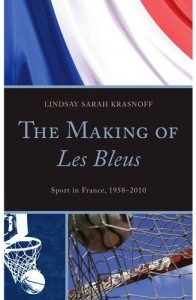 The Football Scholars Forum 2013-14 season resumes on February 12 with a discussion of Lindsay Krasnoff’s The Making of Les Bleus: Sport in France, 1958-2010.
The Football Scholars Forum 2013-14 season resumes on February 12 with a discussion of Lindsay Krasnoff’s The Making of Les Bleus: Sport in France, 1958-2010.
The book “traces the Fifth Republic’s quest to create elite athletes, a compelling tale that serves as a prism through which to investigate the larger history of France, the evolution of society, the impacts of the media revolution, and the government’s mission of public health. It provides perspective on how France coped with and adapted to the post-1945 world and underscores just how much things have changed—yet still remained the same.”
An active member of the Football Scholars Forum (FSF), Krasnoff is an historian of France and Modern Europe, with expertise in sports, media, and foreign policy. You can listen here to Lindsay discussing her book on the New Books in Sports podcast.
To participate in the online 90-minute session, which begins at 8pm Eastern Time, please email me (alegi.peter AT gmail.com) your Skype name (if I don’t already have it) so you can be added to the conference call.
FSF has two more public events scheduled in the lead up to the 2014 World Cup in Brazil. In March (25/26, time TBD), the fútbol think tank is trying something new. Instead of members reading a common book, each participant will read a different fútbol book (or lengthy article) and give a 5-7 minute report about it to the rest of the group. The idea is to produce a sort of “state of the field” snapshot from various world regions and academic disciplines.
Then in April, I’ll be joining several FSF soccerati in attendance at the “Soccer as the Beautiful Game: Football’s Artistry, Identity & Politics” conference at Hofstra University (Long Island, NY). In addition to scholarly papers and presentations, the conference features a special FSF-sponsored roundtable on “Academics, Journalists, and the Changing Trends in Fútbol Writing.” I’ll be doing a post about the Hofstra roundtable in the coming weeks.
Eusebio: How Africa Changed Football
On Sunday, January 5, Eusébio died of heart failure in Lisbon at the age of 71. Born Eusébio da Silva Ferreira in 1942 in what is today Maputo, Mozambique, he became the first African player to acquire global fame. Portugal has declared three days of national mourning in his honor. As per Eusébio’s wish, his coffin was carried to the center of the pitch at Benfica’s La Luz Stadium in an extraordinary ceremony on Monday (see video above). Fans created a memorial that enveloped his statue outside the stadium.
The striker’s standing in the game’s history was celebrated in two excellent obituaries published in today’s New York Times (read them here and here). Many would agree though that the most poetic tribute to Eusébio comes from Eduardo Galeano (click here to listen to the author read it).
Like most African boys, Eusébio grew up kicking makeshift footballs in the streets. As a teenager, he failed a trial with Desportivo, Benfica’s Mozambican subsidiary, because he showed up without proper boots so he joined rival Sporting instead. His big break came when he scored twice against Ferroviara de Araraquara from Brazil, which was touring Mozambique. José Carlos Bauer, the Ferroviara coach and a former member of Brazil’s World Cup team recommended Eusebio to Bela Guttmann, the legendary coach of Benfica. Guttmann was an ardent believer in overseas players and a globetrotting emigrant himself.
In 1961 Benfica signed Eusébio for £7500. Fast and strong, he had that rare combination of mobility, long-range shooting ability, and a striker’s instinct close to goal. These qualities, according to David Goldblatt, made him “perhaps the archetype of the modern football player.” He won 7 league titles , 2 Portuguese FA Cups, and a European Cup. In 1965 he was crowned the best player in Europe, three decades before Liberian striker George Weah, and was top scorer in the 1966 World Cup with nine goals.
He was idolized in Portugal and throughout Africa. His statistics spoke volumes: 317 goals in 301 matches with Benfica; 41 in 64 for Portugal—a record Cristiano Ronaldo has yet to surpass. Together with Pelé, Eusébio was instrumental in elevating the status of black players in world football. He “destroyed the nonsense that Africans could not play soccer—or rather could not learn to harness individual flair for the good of the team,” wrote Rob Hughes in the New York Times. He also exemplified how African labor benefited Portuguese football by providing athletic talent at affordable prices and making it more cosmopolitan.
“Eusébio represented a confident, glamorous, mobile new Africa on the world stage,” Sean Jacobs and Elliot Ross noted in their poignant tribute for Al Jazeera America. “But his remarkable historical achievement was to be the face of not one but two emerging continents. He helped, in his own way, to reshape the idea of Europe itself.”
—
This post draws on material from my book African Soccerscapes: How a Continent Changed the World’s Game (Ohio University Press, 2010).
—
Suggested Viewing/Reading:
Eusébio – Um Jogador de Todos os Tempos (documentary, in Portuguese)
Farewell Eusébio by Sports Illustrated’s Planet Fútbol
“Remembering Eusebio’s brief time in the NASL” by James Tyler with Shep Messing
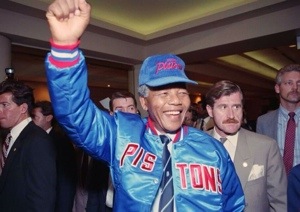 Sport is serious fun. Nelson Mandela, a keen amateur boxer in his youth, appreciated how the antiapartheid sport boycott assisted South Africa’s liberation struggle and, as a democratically elected president, he used the “politics of pleasure” to propel Rainbow Nationalism. Team sports like football reveal much about the experiences and mindsets of neighborhoods, cities, and nations. “The way we play the game, organize it and reward it reflects the kind of community we are,” is how Arthur Hopcraft put it in The Football Man (1968), one of the finest football books ever written.
Sport is serious fun. Nelson Mandela, a keen amateur boxer in his youth, appreciated how the antiapartheid sport boycott assisted South Africa’s liberation struggle and, as a democratically elected president, he used the “politics of pleasure” to propel Rainbow Nationalism. Team sports like football reveal much about the experiences and mindsets of neighborhoods, cities, and nations. “The way we play the game, organize it and reward it reflects the kind of community we are,” is how Arthur Hopcraft put it in The Football Man (1968), one of the finest football books ever written.
These issues strike at the heart of a new project I am embarking on with my Latin Americanist colleague Brenda Elsey, author of a splendid book on fútbol and politics in Chile. Brenda and I will be editing a special issue of Radical History Review on “Historicizing the Politics and Pleasure of Sport.” This marks the first time RHR, an academic journal known for “addressing issues of gender, race, sexuality, imperialism, and class, and stretching the boundaries of historical analysis to explore Western and non-Western histories” will turn its attention to sport. The issue is scheduled for publication in 2016.
Here’s the call for papers:
The global reach of football (soccer), basketball, cricket, and Olympic sports in the contemporary world can be traced back to European and U.S. imperial and commercial expansion. The agents of that imperialism—teachers, soldiers, traders, and colonial officials— believed sport to be an important part of their “civilizing mission.” Military interventions in Africa, Asia, and Latin America, often accompanied by “soft power” cultural programs and private business ventures, fueled the popularity of Western sports. Reform movements tied eugenics and racism to their dissemination. But local elites and subalterns were not simply duped; they enjoyed the games on their own terms. As more communities participated, sport came to represent and constitute broader processes of social change. In the stands, sports pages, and clubhouses, fans rendered sport a place to debate racial and gender hierarchies. In the late twentieth century, international sport became part of a new global capitalist network of sport institutions (e.g. FIFA, International Olympic Committee, International Cricket Council), private corporations, mass media, and migrant athletes and coaches. In this process, sport came to symbolize and intensify unequal social and economic relations.
Histories of sport reveal a paradox: sport generates empowerment and disempowerment; inclusion and exclusion; unity and division. Sports have provided spaces for pleasure, freedom, solidarity, and resistance, but they have also reproduced class privilege, patriarchy, and racism. The performance of masculinities, creation of ideal body types, and the ongoing marginalization of women in sport illustrate these tensions. Recent events in Brazil, where controversy over contemporary mega sporting events merged with massive demonstrations for a range of social justice issues, highlight the unusual capacity of sport both to crystallize inequalities and to trigger civic activism. Reports of labor abuses in Qatar and censorship and environmental damage in Russia cast a dark shadow on the human and material costs of hosting “mega” sports events.
The editors invite submissions from scholars working on any period and world region. We are especially interested in studies that build upon the rich historiography about the nature of agency, identity, and embodiment as a way to explore sport’s contradictory past and present.
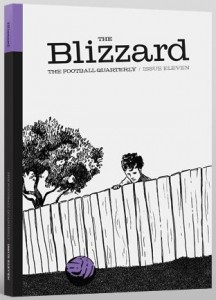 On December 5, Jonathan Wilson, journalist, author, and founding editor of The Blizzard, and the Football Scholars Forum convened for an online session devoted to independent fútbol writing in a digital age.
On December 5, Jonathan Wilson, journalist, author, and founding editor of The Blizzard, and the Football Scholars Forum convened for an online session devoted to independent fútbol writing in a digital age.
Wilson fielded a range of questions from an international audience from five continents. The 90-minute conversation blended English pragmatism and fútbol romantico, and indirectly grappled with Simon Kuper’s critique that “Football just isn’t what it’s cracked up to be,” and “anyone who peeks behind football’s curtain discovers there is no magic there.”
The Forum with Wilson pivoted around the notion that there is a growing English-speaking audience for longer-form writing about the game that goes beyond mixed-zone clichès, diatribes about managers, questionable refereeing decisions, and other narrow, shallow concerns of so much contemporary sport journalism. The challenges and opportunities of publishing in print and digital formats sparked conversation and debate, as did the evolving relationship between the futbology work of reporters and academics.
The audio recording of the session is available here.
For a Storify Twitter timeline click here, with special thanks to Liz Timbs (@tizlimbs).
Learn more about the Football Scholars Forum here.
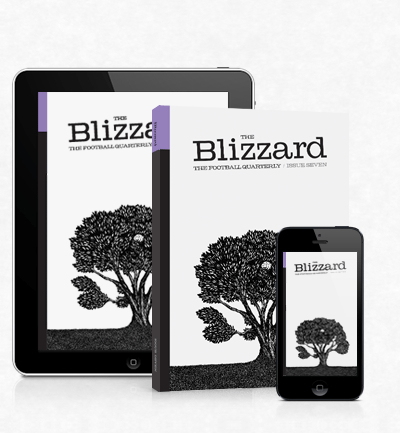 Jonathan Wilson, journalist, author, and founding editor of The Blizzard, is the featured guest at the Football Scholars Forum on Thursday, December 5. Starting at 4pm Eastern (9pm GMT), the online football think tank will discuss the craft of independent fútbol writing in a digital age.
Jonathan Wilson, journalist, author, and founding editor of The Blizzard, is the featured guest at the Football Scholars Forum on Thursday, December 5. Starting at 4pm Eastern (9pm GMT), the online football think tank will discuss the craft of independent fútbol writing in a digital age.
Born in a pub after a Sunderland 4-0 demolition of Bolton in 2010, The Blizzard is a football quarterly that, Wilson says, is “neither magazine nor book, but somewhere in between.” It combines short- and long-form writing and is available in both analog and digital formats. The experience of independent English-language publications like The Blizzard and the recently defunct U.S.-based XI Quarterly, or Howler for that matter, suggests that journalists and scholars share many similar challenges and opportunities in publishing rigorously entertaining, meaningful football writing aimed at readers worldwide. [Click here to read my 2012 blog post on football at the intersection of academic research and popular journalism.]
Issue Nine of The Blizzard is being served up for Thursday’s session [download it here]. Its tasty menu includes: David Conn on the rise of Manchester, and Manchester City; Simon Kuper’s dissection of Barcelona tactics; Philippe Auclair interview with Michael Garcia, Fifa’s Ethics Committee chairman [sic!]; Gwendolyn Oxenham’s search for a pickup game in Teheran; and Igor Rabiner speaking with Lev Yashin’s widow.
To participate in the 90-minute session that takes place simultaneously at Michigan State University and online via Skype, please contact me asap (alegi.peter AT gmail.com) with your Skype name. Folks can also email or tweet me (@futbolprof) questions before the session.
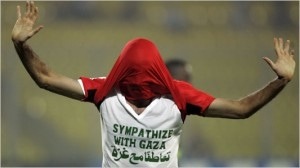 The Football Scholars Forum, an international online think tank, convened on November 14 to discuss Football in the Middle East. The conversation focused on a special issue of the academic journal Soccer and Society, edited by Alon Raab and Issam Khalidi. The group began by noting that while football has been a critical force in broader political and cultural developments in the region, there is little institutional support for studying the game in the Middle East.
The Football Scholars Forum, an international online think tank, convened on November 14 to discuss Football in the Middle East. The conversation focused on a special issue of the academic journal Soccer and Society, edited by Alon Raab and Issam Khalidi. The group began by noting that while football has been a critical force in broader political and cultural developments in the region, there is little institutional support for studying the game in the Middle East.
The ensuing 90-minute discussion demonstrated the value of scholarly collaboration and research on the game. The group explored a dizzying number of topics and territories, including football as a source of unity and hope and as a site of political and ideological conflict; the 2022 World Cup in Qatar; soccerpolitics in Turkey; sport and Islamism; Palestinian and Iraqi Kurdish women’s teams; and football films and poetry.
For a Storify Twitter timeline click here.
Download the mp3 of the session here.
Football and Independence in Zambia
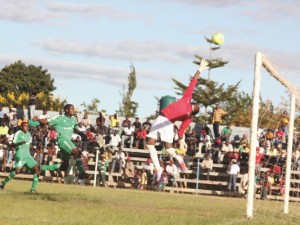 Guest Post by *Hikabwa Chipande
Guest Post by *Hikabwa Chipande
LUSAKA—On a rainy Friday evening at the Pamodzi Hotel, Zambia Open University Professor Ackson Kanduza, president of the Southern African Historical Society, convened a forum based on my paper “Football and Independence in Zambia: A Political and Social History 1950s-1964.”
Part of my doctoral research on colonial and postcolonial Zambian football, the paper draws on archival, newspaper, and oral sources to argue that the changing culture of the African game influenced the anti-colonial nationalist struggle by fighting racial segregation and promoting African leaders to highly visible and prestigious administrative positions before independence.
In the early 1960s, colonial racism in then-Northern Rhodesia was still intense. Segregation kept Africans out of European-owned shops and forced black customers to shop through a window instead; Africans were not allowed to enter whites-only train carriages and buses; and jobs paying higher wages were reserved for whites.
But in 1961-62, black and liberal white businessmen founded the nonracial (racially mixed) National Football League. A black man, Tom Mtine, was named chairman of an otherwise white-dominated league executive. Two years prior to independence, the NFL permitted black players to be on the same teams as whites, and Africans were also allowed to represent the territory in international competitions. The emergence of black administrators like Tom Mtine and the game’s function as a “neutral” cultural form among people speaking 73 languages helped to assert black power as well as a sense of Zambian-ness that cannot be ignored in the history of Zambia.
An audience of both academics and members of the general public posed interesting questions and offered constructive comments. Most participants agreed with me that these sporting events signified an important step towards political freedom. Some noted that as Zambians celebrated their country’s 40th independence anniversary, my historical evidence about black leaders in football and the hosting of an international football tournament in 1964 to celebrate the nation’s birth would be highly appreciated by millions of Zambians. The discussion also grappled with the seemingly contradictory evidence that the British believed the game to be part of the “white man’s burden” while local people used it to fight colonial oppression.
“I did not know that our football has such a rich history,” said Pride Mwaanga; “I was wondering about the connection between football and independence, but now it makes sense!” Other participants asked why this rich history of Zambian football has not yet been explored. Echoing the conclusions of Marissa Moorman’s recent history of music and nationhood in the musseques (shantytowns) of colonial Luanda, Angola, audience members highlighted how, unlike anti-colonial political leaders, Zambian football administrators and players’ contributions to building the Zambian nation are not recognized in typical historical accounts.
Participants also stressed the need to publish biographies of past footballing greats such as “Ucar” Godfrey Chitalu, Dickson Makwaza, John “Ginger” Pensulo and many, many others. Professor Moses Musonda, Zambia Open University Deputy Vice Chancellor, pointed out that we need more scholars to research and write the history of football in Zambia, otherwise we are going to lose this valuable past.
Other interesting contributions came from Mrs. Kanduza and, again, from Prof. Musonda, who both gave testimonies of how they experienced leisure activities in welfare centers during the colonial era. These social centers played a critical role in the development of football. Prof. Musonda stated that Europeans enforced separate social institutions such as welfare halls to make sure that young Africans did not have the opportunity to challenge young Europeans in sport. Ironically, the same welfare centers and sporting facilities helped African men and women build their self-esteem and were later turned into avenues for political agitation.
Prof. Kanduza concluded the event by pointing out that a goal of the Zambia Open University is to organize forums that give opportunities to listen to unheard local voices. He highlighted how the research and discussion of “Football and Independence in Zambia” captures voices and conveys the historical experiences of African people through the prism of sport. The evening ended with a promise to organize more of these lively and insightful sessions in the near future.
—
*Hikabwa Chipande is a PhD candidate in the Department of History at Michigan State University. He is currently in Lusaka researching the social, cultural and political history of football in colonial and postcolonial Zambia. Follow him on Twitter at @hikabwachipande